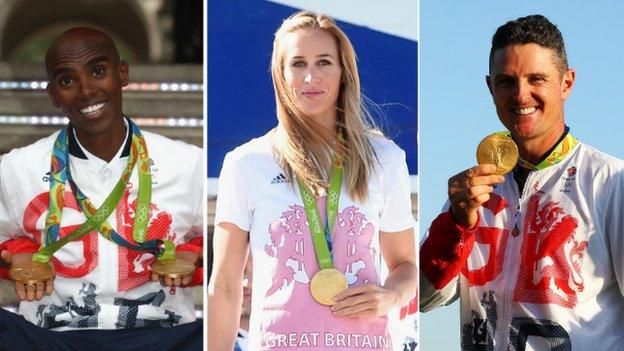Callum Skinner responds over leaked medical records
- Published

Edinburgh's Callum Skinner won gold and silver medals in the Rio velodrome
Olympic gold medallist Callum Skinner has described his frustration after his stolen medical files were made public by hackers.
The 24-year-old cyclist was among 26 individuals whose records were posted on the Fancy Bears website last week.
"If I were to release the documents on my terms then it'd be very different," Skinner told BBC Scotland.
"I'm not averse to having these things public, but I'd have preferred to have done it on my terms."
Skinner added: "This was an invasion of my privacy and it was just put out there with people willing to interpret it as they wish."
Double medallist in Rio
The document suggests that Skinner was granted a therapeutic use exemption (TUE) for the banned substance prednisolone in 2014 and for salbutamol in January of this year.
There is no suggestion Skinner has been involved in any wrongdoing.
Skinner won gold in the team sprint at the Rio Olympics - along with Jason Kenny and Philip Hindes - as well as taking silver in the individual sprint when he was beaten in the final by team-mate Kenny.
The document posted on the Fancy Bears website suggests that Skinner, who has suffered from asthma since childhood, was allowed a TUE for prednisolone - an anti-inflammatory drug that is regularly prescribed for asthma - for a one-off, five-day oral course of treatment in November 2014, while he was competing at the Track World Cup in London.
Desire to point out asthma history
Skinner said he could "understand where the sceptics are coming from".
"So what I'm doing now is having an opportunity to present it in the way I want to present it and, hopefully, people will see that this medication was required and was reasonable; and there's a history of it in my past with the National Health Service," he insisted.
"It's a bit disappointing because these documents are thrown out into the public without any kind of explanation or any chance for me to give my side of the story.
"Over the past weeks, I've been contacting the NHS to try to scramble together some of my own medical records, which ideally, if I'd chosen to release them, I would've released my medical records with my TUEs so that people had a better understanding of my asthma history and why this medication was necessary.
"These TUE certificates aren't just signed off by your team doctor. It's a bit of a collaboration by your team doctor and the governing bodies."
Scrutiny from governing body
Skinner said the UCI, cycling's governing body, closely examined his condition and medical requirements.
"So your team doctor recommends the medication and then it's signed off by another two independent doctors: the UCI and UK Anti-doping - and UCI is our governing body," he added.
"It does go through a few checks and it's certainly not easy to get them.
"The second one I had, which was for salbutamol, they did actually request a bit of my own medical history.
"So, as far as I'm aware, my TUEs went under a good level of scrutiny."
- Published20 September 2016

- Published19 September 2016

- Published19 September 2016
